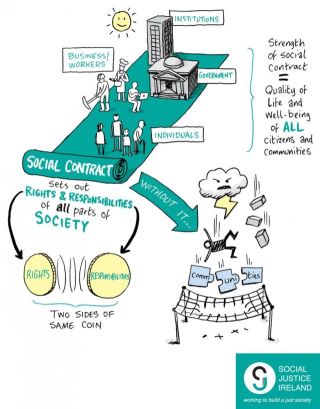The need for a New Social Contract

Social Justice Ireland welcomes comments by new Taoiseach Simon Harris TD in his inaugural speech on the need for a new social contract. It is important to acknowledge that despite well documented problems and challenges, Ireland is in the privileged position of having public services and social infrastructure to rely on at times of crisis. This is due to the social contract that underpins our social infrastructure. The social contract as a concept has evolved to encompass a situation whereby citizens contribute to the common good – whether economically, socially or culturally – on the assumption that the State will ensure a minimum standard of living, provision of essential social services and infrastructure, and the protection of their basic rights.
As part of this social contract arrangement in a modern democratic society, citizens may expect:
- access to meaningful work, as well as protection from poverty at times where paid employment is not accessible;
- a minimum floor of income and services;
- an education system that is relevant, accessible and high in quality;
- a guarantee that their needs will be met at times of ill-health;
- the regulation and protection of the environment for the good of all citizens; and
- ensured participation in civic life and in the decisions that affect them.
In return, citizens have a responsibility to contribute to society in different ways at different points in the lifecycle. This may be through being employed; through paying taxes; through engaging in caring and voluntary work; or making other contributions to the economic, social, cultural or environmental wellbeing of society.
A key part of the social contract is solidarity between generations. At different points in the lifecycle, all of us will (from a financial perspective) be either net beneficiaries from, or net contributors to, society. This differs, depending on whether we are children, adults of working age, or pensioners. It depends on whether we are in full-time or part-time education, engaged in caring work or in paid employment, or volunteering in the community. But, at almost all times, we are contributing to and benefiting from society in different ways.
We must reconceptualise the interaction of employment and work, taxation, and welfare and give serious consideration to policies such as a universal basic income and universal basic services. In September 2020, Social Justice Ireland published a series of recommendations on the creation of a new social contract. Our Annual Social Policy Conference that year, which included papers from all five social pillars, also provided a cohesive way forward.
We look forward to engaging with the new Taoiseach on this issue in the coming weeks.
